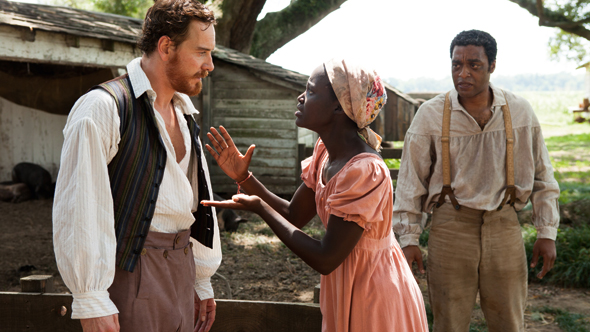12 Years a Slave (2013) is a fantastically
powerful work, one that has deservedly-so been gaining acclaim from critics and
the average cinema-goer. It has also gained a heap of nominations at this year’s
Oscars, leading to the discussion of ‘will Steve McQueen be the first black
director to win?’[1].
After watching the film, and being a huge admirer of the previous two McQueen
feature films, I couldn’t help but wonder why this film has led to McQueen
making a massive jump into the mainstream conciseness. Hunger (2008) and Shame (2011) are as equally compelling and creative as 12 Years a Slave, yet received none of the same adulation in the
mainstream (both did however do fantastically well with critics and on the
festival circuit). All three films seem to deal with taboo subjects, Hunger with IRA hunger strikes, Shame with sex addiction, 12 Years a Slave with slavery. All three
deal with issues of the body, all have scenes and structures that stray from
the norm and all three maintain a visual beauty to them.

The
main difference is clear however, 12
Years a Slave deals purely with a ‘black-persons history’. It can be called
a ‘black story’, and located as ‘black cinema’. Whereas the other two are ‘raceless’[2], 12 Years a Slave can be specifically
sold as a black film by a black director. This may seem counter-intuitive in
the fact that if it is a ‘black film’, then how can it become the norm in a
white mainstream. But slavery is something white people can feel sympathy for,
being able to stand from afar and say “Yes, what terrible things happen to black
people!”, feel satisfied and then leave the cinema. By watching 12 Years a Slave, the vastly white
majority of Oscar voters (94% are white, 77% male. 2% are black[3])
can show that they do care about black people. It can be argued therefore that
there is almost a taboo about criticising a film such as 12 Years a Slave. If you criticise the film, are you therefore
saying you don’t care about the treatment of people during slavery? Of course
not, but with the rise of White Guilt[4],
white people are often weary of race-related comments. Add to this a lot of old
white men man panicking over their voting cards, then we are bound to get some
strange voting. This almost makes the voting hollow. If the white voters can
find a film in which they can seem to prove they actually do care about black
people, then they can feel satisfied.
This is repeated in Best Picture nominees, and those with black
producers. In addition to the three mentioned, we also have The Colour Purple (1985) that talks of
slavery and poverty. The Blind Side (2009)
with a stupid black man who makes it to the NFL thanks to his white adoptive
Mother, and finally Django Unchained (2012)
with Tarantino blaxploitation riff on slavery. Again, all are able to fit into
a race-specific frame work, which limits black people into only a few select
stories, that of poverty and slavery.
This
is not to say that any of these films are bad. I would say that out of those
mentioned, only The Blind Side is
overtly racist and poor. Nor do I feel these films intend to re-enforce negative
(or any) stereotypes, but what they do do, is reaffirm the limited number of
stories that can be had for films involving black people. This does not mean
that story on slavery is any less important or valued because of this. Although a Best Director win at this year’s
Oscars for McQueen would be a fantastic leap for black directors, it will not
really break any ‘glass-ceiling’ for black directors. Until a black director
makes a film that cannot be identified as being black, and wins major awards
for it, are we truly making progression in terms of where non-white film-makers
are in Hollywood and the mainstream.
[1] http://www.theguardian.com/culture/2014/jan/17/steve-mcqueen-first-black-director-oscar
[2] Raceless
in the terms that white characters are seen as the norm. More reading can be
done on this with the essay by Peggy McIntosh and ‘White Privilege’. http://www.amptoons.com/blog/files/mcintosh.html
[3] http://www.latimes.com/entertainment/news/movies/academy/la-et-unmasking-oscar-academy-project-html,0,7473284.htmlstory#axzz2qw13rmVH
[4] http://en.wikipedia.org/wiki/White_guilt
No comments:
Post a Comment